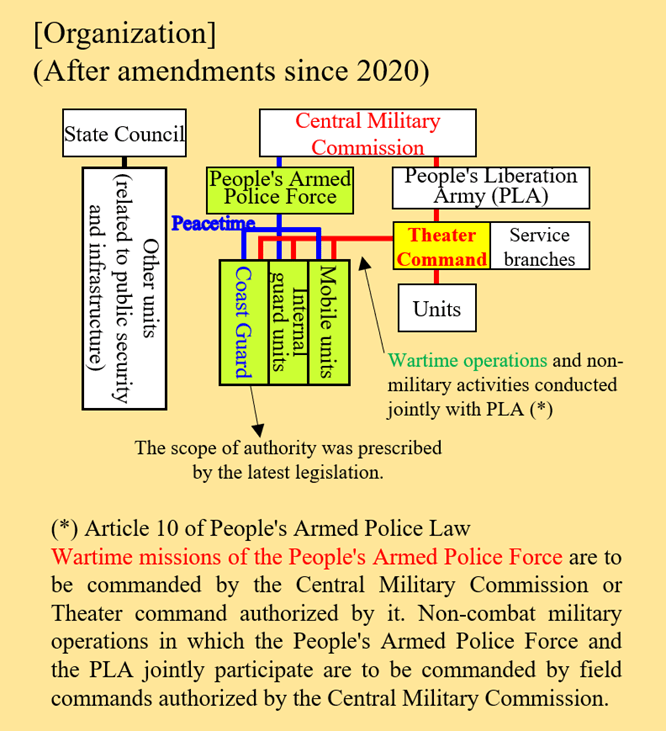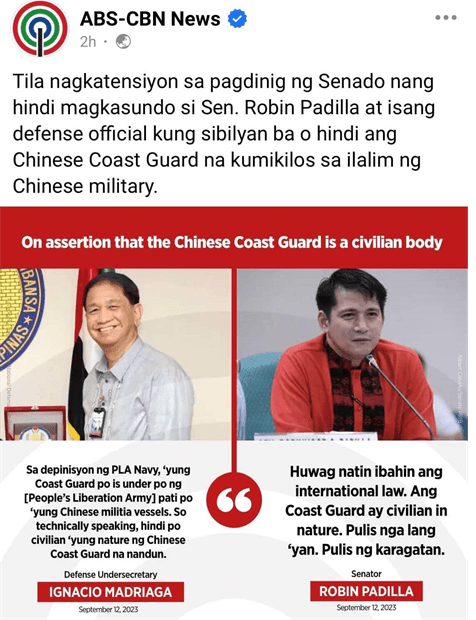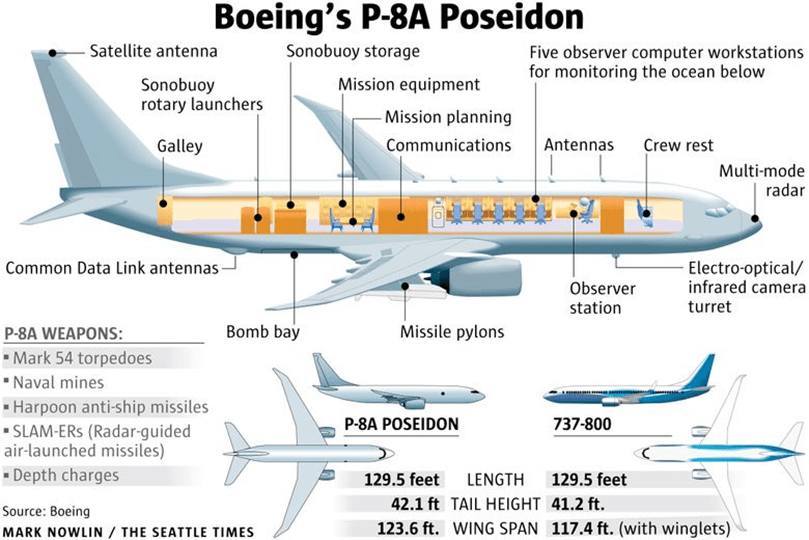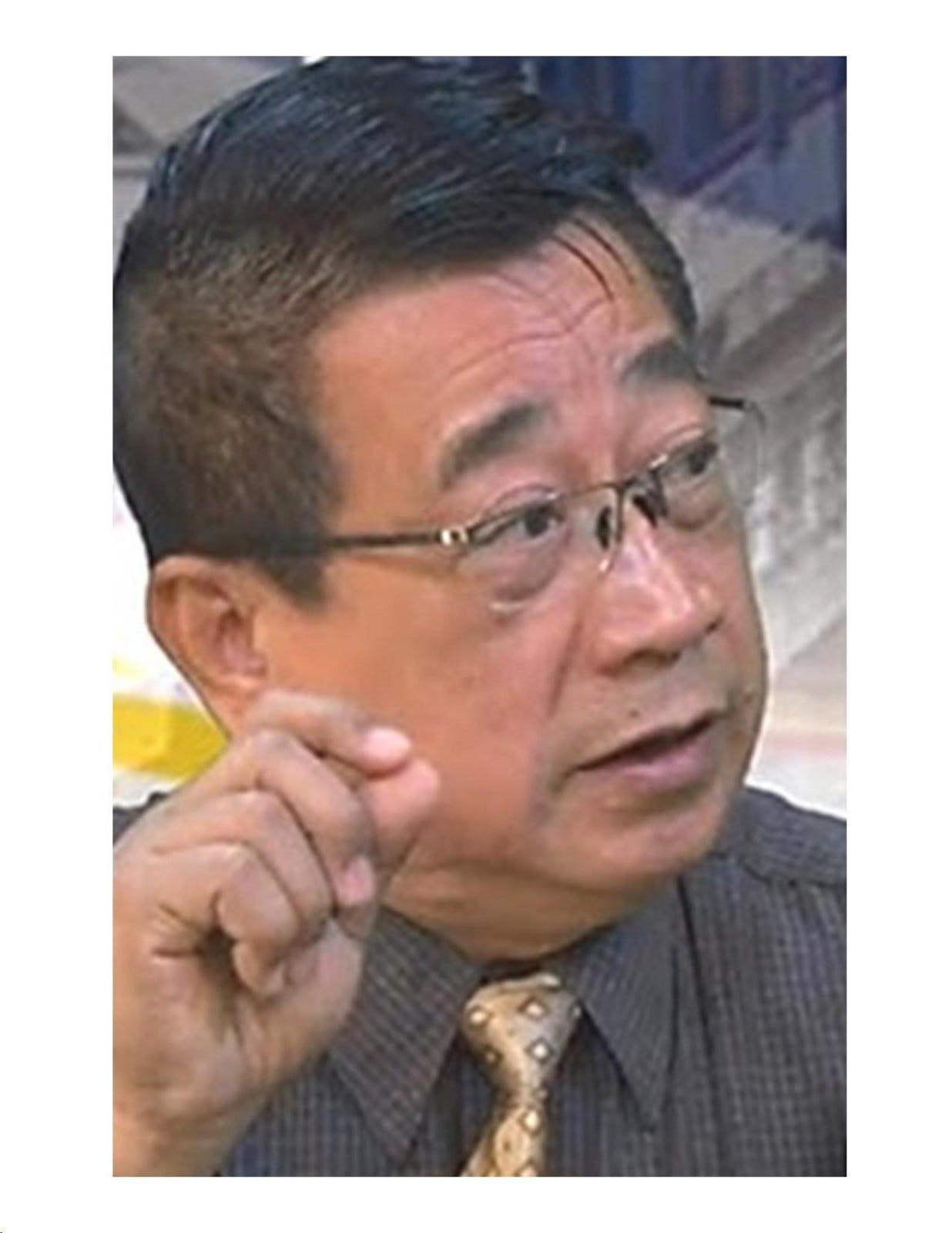Robinhood wins debate, as Marcos Civilianizes Ayungin
The Philippines will push for a non-military approach to address the tension surrounding the Ayungin shoal in the South China Seas as ordered by President Ferdinand Marcos Jr.
This is after Senator Robinhood Padilla stood firm even as many wannabes, including fellow senators, debated him at a budget hearing last September 12 in the Senate Committee on National Defense.
The issues were first on the persona of the Chinese Coast Guard and second whether the presence of a US Navy spy plane was an escalation of the tensions in the mission of the Philippine Coast Guard to resupply our Marine peersonnel at the BRP Sierra Madre at Ayungin Shoal.
Senator Risa Hontiveros, Defense Undersecretary Ignacio B. Madriaga, Undersecretary of National Defense for Strategic Assessment and Planning Ignacio Madriaga and self-proclaimed maritime expert Jay Batongbacal contested the civilian nature of the China’s Coast Guard because as they claimed it was under the Peoples Liberation Army – Navy.
For instrance, Madriaga argued that under the definition of the PLA Navy, the Coast Guard is under the People’s Liberation Army, including the Chinese militia vessels. So the undersecretary asserted that “technically speaking the nature of their Coast Guard there is not civilian.”
Padilla quickly dismissed Madriaga’s misperception. Speaking in the vernacular, he said, “Let us not change international law. The Coast Guard is civilian in nature. They are policemen. They police the seas.”
After two days, the senator, who topped the 2022 senatorial elections with 28 million votes, further submitted a clarification in his facebook page from Dr. Massimo Lando of the City University of Hongkong citing Article 2 of the Coast Guard Law of the Peoples’ Republic of China:
“Article 2 The coast guard units of the People's Armed Police Force, to wit, coast guard agencies, shall uniformly perform the duties of maritime rights protection and law enforcement.”
For the further enlightenment of Madriaga, Batongbacal and Hontiveros, here is the organization chart specifying during peacetime to whom the Chinese Coast Guard reports to – the People’s Armed Police Force that in turn reports to the Central Military Commission.
The problem with us Pinoys is that we are too legalistic. If we follow the three’s hairsplit, even the People’s Armed Police Force would not qualify to be a civilian force because it reports to the Central Military Commission which is on top of both the police and the army.
What really is important are the functions being performed on the ground. In this case, the Chinese Coast Guard exercises maritime rights protection and law enforcement in the seas.
If we overread ourselves, then the AFP is a civilian body because it reports to the civilian DND. Moreso, the Philippine Coast Guard will have nothing to do but man ports and process passengers on sea travel because they are under our Department of Transportation.
Maybe this is why Admiral Artemio Abu bought for his own use an P4 million Land Cruiser, had it bullet-proofed for another P4 million and bought his staff 36 Isuzu MUX sport utility vehicles.
In this case, Madriaga himself would not qualify as a civilian serving in the national defense department because he has been a brigadier-general in the Philippine Army having served in the military since graduating from the Philippine Military Academy since `1991.
This is also why I cannot fault former NSA Ronald Llamas coming to the rescue of Risa Hontiveros attacking Padilla on social media even if she has long denied that they are a couple.
Another bozo, Jonathan Malaya, undersecretary for the national security council, who has developed a bad habit of second guessing the President on foreign policy, again contradicts with the Presiident:
“…China has a different system, as we all know they have a different political system, they are technically an authoritarian state run by a ruling Communist Party of China and they have placed their coast guard and the CMM under the Chinese Military Commission so they are technically part of the military infrastructure,” he said waxing sinophobically.
When asked if the Philippines should respond not just with the Philippine Coast Guard but with the Philippine Navy to counter the CMM, Malaya ridiculously added a military slant, “In all of these resupply missions, there are always two Navy ships, 20 to 30 nautical miles away, coming with the Philippine supply vessels ‘just in case something happens’.”
The second bone of contention was whether the presence of a US Navy Poseidon spy plane hovering overhead during the resupply mission being construed as an escalation of the tension in the South China Seas.
Senator Padilla reminded the senators and the witnesses present that was how we lost Scarborough Shoal, when a gray ship (BRP Gregorio del Pilar) arrested ordinary fishermen flying China’s flag, attracting the support of Chna’s Coast Guards (white ships).
During an orientation briefing of the US State Department in Washington DC after my arrival in Washington Dc to serve as the Philippine Embassy’s press attache, a gray ship mounting civilian vessels is an open declaration of war against the flag they carry.
Senator Francis Tolentino, who arrived late, exacerbated the discussion by asserting that the Navy Poseidon was not a war plane.
Wikipedia says otherwise: “The Boeing P-8 Poseidon is an American maritime patrol and reconnaissance aircraft developed and produced by Boeing Defense, Space & Security, derived from the civilian Boeing 737-800 and developed for the United States Navy (USN).
“The P-8 operates in the anti-submarine warfare (ASW), anti-surface warfare (ASUW), and intelligence, surveillance and reconnaissance (ISR) roles. It is armed with torpedoes, Harpoon anti-ship missiles, and other weapons, can drop and monitor sonobuoys, and can operate in conjunction with other assets, including the Northrop Grumman MQ-4C Triton maritime surveillance unmanned aerial vehicle (UAV).”
Usec Madriaga acknowledged for the record the US Navy Poseidon was in the affected area, and confirmed it was in coordination with the Armed Forces of the Philippines.
The former brigadier general even said with a straight face, that it was the activity of the Chinese Coast Guard that was illegal, but the presence of the AFP and the US military is within “our” right because that was “our” exclusive economic zone.
Padilla cut him short suggesting that was irrelevant so it did not stretch into deeper legalisms again. China has sent its coast guard there because they consider almost all of the South China Seas its territory under historic rights and it has proof of that. Besides, EEZs cannot penetrate sovereign territory of any other state.
Madriaga was of course citing the American playbook on sovereignty rights extended by a single treaty the United Nations Convention on the Laws of the Seas adopted only in 1982, and affirmed by a impaired arbitration registered with the Permanent Court of Arbitration in its fake awards in 2016.
The entertainment will not be complete if we don’t mention here that Padilla was able to make self-proclaimed “expert” Jay Batongbacal of the UP Institute for Maritime Affairs and Law of the Sea, foolhardily endorse the participation of the American military for our resupply missions.
Asked for justification, Batongbacal had no ifs and buts invoking the Mutual Defense Treaty between the US and the Philippines. This is unfortunate because if it did not minimally expose his ignorance on the treaty, then he was actually twisting the purposes and function of this alliance, and at worse violating it.
Article I of the treaty - each party is to settle international disputes in a peaceful manner so that the international peace is not threatened, and to refrain from the threat of the use of force in any manner that is inconsistent with the purpose of the United Nations. We make no bones about it - the insertion of our Armed Forces and a foreign war plane in our present South China Sea disputes is an act of war.
Article II states that each party either separately or jointly through mutual aid may acquire, develop and maintain their capacity to resist armed attack. We are not under explicit or implicit threat of any attack by a foreign country.
Article III states that the parties will also consult one another when either party determines that their territorial integrity, political independence or national security is threatened by armed attack in the Pacific. No preceding consultations has been activated.
Article IV states that an attack on either party will be acted upon in accordance with their constitutional processes and that any armed attack on either party will be brought to the attention of the United Nations for immediate action.
In this regard, two important notes.
First, the treaty does not have a provision on “automaticity”. The participation of the United States will have to be determined by a declaration of war by its Congress.
I would like to refresh you of the senatorial debate during the 2022 elections: https://web.facebook.com/watch/?v=620350922365253
Second, there is no common definition of terms. Our claim against China is anchored on sovereign rights for use of underwater resources within a 200-nautical mile “exclusive” economic zone on the basis of one specific treaty UNCLOS that was only adopted in 1982 and an impaired arbitral ruling in 2016.
On the other hand, China’s claim is for sovereignty and ownership on the basis of historic rights, significantly defined in a statutory construction of history from the Second Sino-Japanese War of 1937 to perfection by the United Nations General Assembly Resolution 5728 in favor of the Peoples Republic of China in 1971.
Article V defines the meaning of attack and its purpose which includes all attacks by a hostile power will be held as an attack on a metropolitan area by both parties or on the island territories under its jurisdiction in the Pacific or on its armed forces, public vessels or aircraft in the Pacific. In many previous bilateral consultations, even the United States has refused to include the South China Seas and any hypothetical scenarios to clarify this provision.
Preemptive Strike
Actually, an actual armed attack is not even necessary.
The Philippines, more specifically, these EDCA bases, would become prime targets for retaliation or attacks because of US military assets and the presence of foreign troops.
Melissa Loja, a senior research fellow at the Integrated Development Studies Institute and an expert on international law, said that the EDCA has created a "security dilemma" for the Philippines. She said under the agreement, the Philippines has no right to inspect, much less demand permission for the positioning of weapons.
"The same threat to our country would still exist, because the US can preposition weapons in (any location) and magnet a counterstrike (or instigate) preemptive strike from any of the elements of the United States," she added.
Under this scenario, Loja said that the presence of US military weapons means the Philippines can no longer be considered a "neutral state" and will become a legitimate target in an international conflict.
According to Professor of Government and Foreign Service at Georgetown University Anthony C. Arend, in his paper “International Law and the Preemptive Use of Military Force” published by the Washington Quarterly, preemptive strike is “the use of military force in advance of a first use of force by the enemy”- it is a first strike in anticipation of receiving an attack from an opponent in the near future.
The United States has used notorious for using this excuse for attacking many countries around the globe. Foremost of which is the attack on Iraq for fictitious “weapons-of-mass-destruction”.
While the United Nations Charter expressively forbids the use of military force in international relations with aggressive war declared illegal following the Nuremberg International Military Tribunal, the exception in principle is in cases of self-defense, a state is not obliged to suffer the first blow of an attack before it may be permitted to respond.
What does this mean? A state (China) may launch an attack preemptively against another (the Philippines) if it perceives there is an imminent threat (coming from the American EDCA bases).
Congratulations, Senator Padilla. You are genuinely patriotic in keeping your country out of harms way. Before that, you are a man deeply committed to truth and to peace!
Adolfo Quizon Paglinawan
is the anchor of Ang Maestro – the Unfinished Revolution at Radyo Pilipinas1, co-host of Opinyon Ngayon at Golden Nation Network Television, a political analyst, and author of books. His third book, The Poverty of Power will soon be off-the-press. It is a historiography of controversial issues of spanning 36 years leading to the Demise of the Edsa Revolution and the Rise of the Philippine Phoenix. Paglinawan’s past best sellers have been A Problem for Every Solution (2015), a characterization of factors affecting Philippine-China relations, and No Vaccine for a Virus called Racism (2020) a survey of international news attempting to tracing its origins. These important achievements earned for him to be named one of the 2021 international laureates for the Awards for the Promotion of Philippine-China Understanding. Ado, as he called for short, was a former press attaché and spokesman of the Philippine Embassy in Washington DC and the Philippines’ Permanent Mission to the United Nations in New York. Facebook
Email: contact@asiancenturyph.com
Facebook: https://www.facebook.com/asiancenturyph/
Twitter: https://twitter.com/AsianCenturyPH









